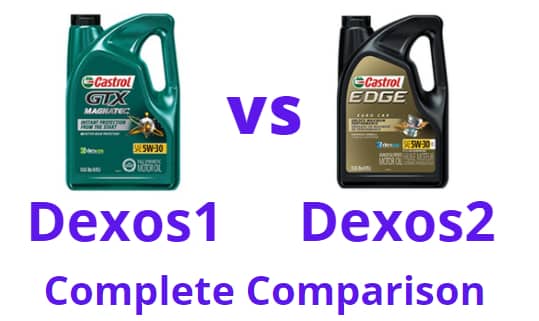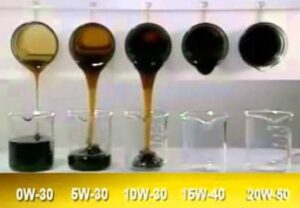Back in 2009, General Motors started their own engine oil specification known as Dexos Oil, to provide their customers with high-quality engine oil. GM on receiving a tremendous response on dexos from all around the world decided to further simplify the supply chain process.
As a result, they divided dexos specification into different classifications like dexos 1 and dexos 2 for gasoline and diesel engines respectively. Even though dexos 1 and dexos 2 carry somewhat similar traits, their core objective is different.
For instance, dexos 1 is specifically designed for gasoline engines, whereas dexos 2 is developed for both diesel and gasoline engines in the Europe region. Similarly, dexos 1 fulfills the requirements of ILSAC GF-5 and API SN as compared to dexos 2, which meets the requirements of API SN and ACEA C2/A5/B5.
At the same time, there are some characteristics that they share. In this article, we’ll try to give you information on everything you need to know about dexos 1 vs dexos 2.
You can start by taking a quick look at our below chart to get more clarity.
| Dexos 1 | Dexos 2 | |
|---|---|---|
| Viscosity | Good | Standard |
| Suitable Engines | Gasoline | Diesel |
| Suitable Models | Compatible with both modern and older models | Compatible with both modern and older models |
| Longevity | Good | Average |
| Fuel Economy | Good | Average |
| Grades Available | 0W-20 | 5W-30 |
| Value for Money | Excellent | Standard |
| Available on Amazon | Available on Amazon |
Dexos 1 and dexos 2 can be baffling for some as they contribute to the same cause i.e providing a premium quality engine oil. But don’t worry, we have described some of the major differences and similarities between them so that there will be no room for confusion.
Differences between dexos 1 vs dexos 2-

Engine Suitability- The key difference between dexos 1 vs dexos 2 lies in their compatibility with different engines. Dexos 1 is applicable for gasoline engines. On the contrary, dexos 2 works perfectly well with both diesel and gasoline engines.
Assigned Regions- The oils specified by each specification is designated for separate areas of the world. Dexos 1 is allocated for the entire Asia and North American region. Similarly, dexos 2 is also used in Asia and North America, but it is specifically designed for the European region.
Approved oil list- Dexos 1 and dexos 2 has a variety of oils that they license. On the one hand, Dexos 1 approved oil list has more than 500 oils, but on the other hand, the dexos 2 approved oil list has around 200 oils.
Similarities between dexos 1 vs dexos 2-
Fully-Synthetic oils-Both the specifications by GM i.e dexos 1 and dexos 2 include oils that are 100% synthetic as they provide better results than synthetic blended oils.
Fully-Backward Compatible- Both dexos 1 as well as dexos 2 oils are perfectly suitable to utilize with all types of models. Even though both specifications came into being after 2011, they are applicable to vehicles prior to 2010 too.
Compatible with other brand’s vehicles- Another similarity between the two specifications is that oils licensed by both can be easily used with any branded vehicle. While their compatibility is tested with GM engines, they can still function well with Non-GM engines.
Detailed Comparison of dexos 1 and dexos 2-
Viscosity-

Viscosity simply means the rating of fluidity in the oil. Usually, good oil should balance both high and low viscosity levels.
Dexos 1 has a better viscosity ratio as compared to dexos 2. The oils included in the dexos 1 approved oil list are known to facilitate smooth operation even during the low temperature of North America.
At the same time, the adequate viscosity level of dexos 1 oil won’t let the oil wither out amidst high temperatures. One of the best oil in terms of viscosity from the dexos 1 approved list is Castor Edge High Mileage Oil with a 5W-30 viscosity grade.
However, this doesn’t mean that dexos 2 approved oil list doesn’t have oils with adequate viscosity grades. The fluidity of dexos 2 oils is well-known to keep the texture of the oil thicker in hot weather but sadly they aren’t very good for cold weather.
Pro-tip- To know the viscosity grade of your vehicle, check the manufacturer’s manual. Always choose accordingly.
Suitable Engines-
Dexos 2 has an upper hand here because, unlike dexos 1, which is applicable only to gasoline engines, dexos 2 is appropriate for both diesel and gasoline engines. But, let us make one thing clear, dexos 2 is utilized in both diesel and gasoline engines only in the European countries.
Anywhere else in the world, dexos 2 is used only for diesel engines. The reason behind this is that the use of light-duty diesel engines is higher in Europe than in America.
Therefore, supplying dexos 1 for a smaller percentage of gasoline vehicles in Europe would have complicated the supply chain of GM. So, for the convenience of their customers, GM decided to let gasoline engines in Europe also use dexos 2 oils.
On the other hand, dexos 1 is used only in North America and the Asian region.
Suitable Models-
In terms of suitable models, they are both equal. But that wasn’t always the case. Dexos 1 gen 1 used to license synthetic blended oils.
These synthetic blended oils were not suitable for older models. In fact, they turned out to be a failure for modern engines too.
As a result, dexos 1 gen 2 was formed with pure synthetic oils that were tested with both newer and older engines. The low proportion of sulphur with added higher anti-oxidants in these fully synthetic oils resulted in backward compatibility. Similarly, dexos 2 is also suitable for all sorts of models because of the upgraded additives used in the oils.
Longevity-
Even though the majority of fully synthetic dexos oils last longer than any other oil on the market, there is still a minor difference between dexos 1 vs dexos 2 oils. The difference is in the quality of the synthetic base stock used in each oil, where dexos 1 has superior quality.
Also, Dexos 1 oil used in gasoline engines has to go through the infamous LSPI test to decrease the premature oxidation of oil in the long run. As a result, dexos 1 oil change intervals increase drastically. The oil change interval recommended by GM for dexos 1 is 15000 miles.
On the other hand, dexos 2 oils used for both gasoline and diesel engines are more filtered, thus, creating more sludge when driven for long rides. Still, they can offer approximately 10,000 miles between oil change durations.
Fuel Economy –

Improved fuel economy is the main agenda of both dexos 1 and dexos 2 specifications. But dexos 1, with its upgraded classification dexos 1generation 2, and generation 3, is a lot better as compared to dexos 2, for two reasons.
One is that all dexos 1 oils must pass various fuel economy tests to determine their efficiency. Although dexos 2 has its own criteria to evaluate the capability of oil to increase fuel economy, it’s not as meticulous as the fuel economy tests performed by dexos 1. The second reason is the high demand low HTHS ( High temperature high shear) viscosity of dexos 1.
With the growing demand for better fuel economy, the pressure for low HTHS has increased in order to reduce the strain on modern engines. The HTHS value of dexos 1 is >2.6cP and >2.9cP respectively, whereas the HTHS value of dexos 2 is > 3.5 cP.
Grades Available-
Based on the oil’s ability to function in extreme temperatures, each oil comes with a viscosity grade level. Dexos 1 and dexos 2 approve numerous oils each year and provide a variety of viscosity grades.
Let us see the grades available by both dexos 1 and dexos 2 based on factory fill and service fill and determine which one is better.
The factory fill viscosity grades available by Dexos 1 oils are 0W-20, 5W-20, 5W-30, and 0W-30. Similarly, service fill grades available are 0W-20, 5W-20, 5W-30, and 0W-30.
However, factory fill viscosity grades accessible in dexos 2 oils are 5W-30 and 0W-40. The service fill grades are 5W-30, 0W-30, 5W-40, and 0W-40.
Now, the most crucial viscosity grades that all the famous brands in the industry provide are 0W-20 and 5W-30. Since dexos 2 doesn’t include 0W-20, it is one step behind dexos 1 oils.
Value For Money-
To compare the worth of dexos 1 oil with that of dexos 2, you should know that both have their own strengths. Still, if we look at their overall performance, dexos 1 certainly overpowers dexos 2. Dexos 1 Generation 2 and Generation 3 were the results of a blunder made by dexos 1 Generation 1.
That’s why when GM engineers came up with dexos 1, Generation 2, and 3, they didn’t leave any stone unturned. From the rigid testing process to adding more advanced additives to making it flexible with any kind of model, they did everything in their power, to make them unbeatable.
Whereas dexos 2 was mainly created to meet the requirements of the European automobile market, where diesel engines are more popular. Therefore, choosing dexos 1 over dexos 2 should be a no-brainer when it comes to value for money.
How much do you need to pay for the dexos oil change?
Dexos oil is more expensive than conventional oil, so obviously, the oil change will cost you some extra dollars too. Also, if your filters need to be changed too, then some additional cost may be needed.
If you are planning to get your oil changed soon, then you should be ready to pay anywhere from $60 to $100.
Pro-tip- To avoid spending your hard-earned money, you can do the oil change at home too. With the help of your vehicle’s manual, some tools, and YouTube videos, you can easily perform the task.
But even if you decide to spend the money on a dexos oil change, there is good news for you. The extended drain intervals provided by dexos are exceptionally good. So you won’t need to do it more often. Moreover, dexos oil saves you from other service charges too, so it’s probably worth it.
Is Mobil 1 dexos approved?
The straightforward answer is yes. Mobil 1 is dexos approved. Initially, when the dexos engine oil specification was first introduced by GM, many famous oil brands like Valvoline and Mobil 1 were a little hesitant to get their oils licensed by it.
It was mainly due to the huge licensing fee that GM was charging. But the popularity of dexos oil kept increasing to a greater extent with each year because of the quality approved by GM’s rigorous tests.
Hence, later on, many brands decided to get their synthetic and synthetic blended oils approved by dexos. One of those brands was Mobil 1.
There is a wide variety of Mobil 1 oils that have a dexos logo at present. One of the best Mobil 1 approved oils is Mobil 1 Extended Performance, which is approved by dexos 1 Generation 2.
You May Like:-
Should I change oil before or after long trip?
The answer to this question is somewhat conflicting. Whether or not you should change your oil before the trip depends on when you last changed the oil, your driving habits, the type of oil you use, etc.
If you are planning a long road trip with synthetic diesel oil, you will probably be fine till you come back. This is because diesel oils don’t exhaust as fast as petrol, and synthetic oil itself gives more mileage than regular oil.
But not changing the oil before a long trip with petrol would not be a wise choice, even if it’s synthetic. However, make sure you change the oil at least two weeks before the road trip to avoid any complications.
Conclusion –
To sum it up, we could say that between dexos 1 vs dexos 2, dexos 1 engine oil specification has clearly won the race. On one hand, dexos 1 not only lasts longer but also provides better fuel economy and industry-approved viscosity grades.
On the other hand, one major advantage of dexos 2 is its mass usage. It is versatile enough to work with both diesel and gasoline engines. Also, it is fully backwards-compatible. Apart from this, dexos 2 is far behind dexos 1 in other categories.
